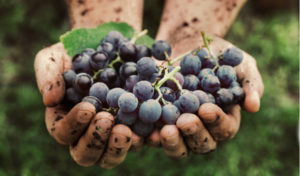
By mythja @ Shutterstock.com
There is a new movement growing in the world of wine. Raw wine, or natural wine, is invading the spaces where health food and alcohol meet. Elin McCoy, writing at Decanter.com says the movement “resists easy definition,” but the basics are that “Raw Wine celebrates wines with emotion… that have a humanlike, or living presence.”
McCoy cautions that “Noble intentions, of course, can’t excuse wines that taste like cider and carry whiffs of barnyard, vinegar and mousiness. Dismissing flaws as ‘a wider range of flavours’ doesn’t help either the wines or the winemakers.”
But despite what could be a minefield of amateurism, McCoy has found the movement is growing up, writing:
Yet despite badly made examples, natural wine has arguably been the major movement of the 21st century wine world.
Though only accounting for a tiny amount of wine sold, the trend is growing in every country, and has had a serious impact on mainstream wines, in part by encouraging a new desire for freshness, as opposed to the once-popular heaviness of oaky, alcoholic bottles.
It’s influenced both top conventional winemakers and new young ones to experiment and embrace some of the core tenets of natural wines.
At the same time, the overall quality of natural wines has rapidly improved, too. Most of the 122 producers at Raw Wine poured reds and whites that impressed me with their subtlety, energy and individuality.
Winemakers whose wines often used to be hit-or-miss, such as those from Abe Schoener’s The Scholium Project, now show very assured winemaking. His skin-fermented Sauvignon Blanc, The Prince in his Caves 2015, was stunning.
The no-sulphur wines from Oregon’s Swick Wines had zing and structure; the low-sulphur Methode Sauvage Cabernet Franc from the Santa Cruz Mountains had the savour of a delicious Loire red.
I’m personally convinced that the route of organic and biodynamic viticulture – perhaps the first step towards natural wine – is essential in a world where herbicides and pesticides are adversely affecting the environment and human health.
If natural wine makes people think harder about how the wines they drink are produced, that’s a good thing. Having what natural wine stands for – the real deal – become what’s expected in wine would be, too.
Read more here.
Isabelle Legeron | Lessons From The ‘Natural Wine’ Movement
If you’re willing to fight for Main Street America, click here to sign up for my free weekly email.





